(Norman Rockwell, “Blacksmith’s Boy.” 1940)
In her examination of feminist theory concerning the upbringing and education of young men, especially those espoused by Carol Gilligan, Christina Hoff Summers challenged their assertion that men are civilized by “diminishing their masculinity.” Sommers wrote:
It is obvious that a boy wants his father to help him become a young man, and belonging to the culture of manhood is important to almost every boy. To impugn his desire to become “one of the boys” is to deny that a boy’s biology determines much of what he prefers and is attracted to.
Sommers cites several studies and the testimony of experts who make a direct correlation between a lack of male role models and an uptake in violence among young men. I would also argue that this same sense of alienation from masculinity has caused another parallel phenomenon in society – the rise of homosexuality.
Famed “gay” novelist Andrew Holleran made the following observation: “It may be reductive to observe that in some persistent way gay men seem to be searching for masculinity, or some version of their father in another man.”
In some, this sense of alienation from the father can cause a major psychological break: a study reported that men whose parents divorced before they were 18 are two to three times as likely to seriously consider taking their own lives as men whose parents were not divorced by that age. The lead researcher in that investigation stated: “The loss of a male role model for the boys may seriously impact their well-being. Other research has indicated a positive father figure is very important for young men and boys, to develop their gender identity and learn ways to regulate their emotions and enhance their mental health.”
As Andrew Holleran further noted: “Fathers, to some extent, no matter what else they do, are supposed to initiate their sons into the male role, the realm of men, which is to say, the world.” When the father perceives his failure, it’s often crushing for him and his son. Consequently, inside – the father feels that he let down his son. Richard Isay, a psychiatrist who specialized in male homosexuality, argued that some fathers perceive a noticeable peculiarity in their sons and subsequently, albeit unconsciously, reject the boy. This sense of rejection goes to the core of the “gay” pain expressed in the song “Not My Father’s Son,” from the transgender themed musical “Kinky Boots.” Tyler Glenn, the lead singer of the band Neon Trees, talked about his relationship with his father, before he “came-out,” he remembered: “…my father broke down sobbing and began to tell me how sorry he was that he wasn’t the father I needed.”
A larger societal need among boys and young American males to believe in rather traditional (bold and fearless) personifications of masculinity is largely responsible for the immense popularity of superhero movies. In addition, the inability to recognize the almost hidden examples of everyday manly achievement, that Normal Rockwell beautifully captured in his painting “Blacksmith’s Boy,” has caused masculinity to become caricaturized in the comic book hero or fetishized in homosexuality.
Legendary “gay” writer Armistead Maupin, who himself is partnered with a man 27 years his junior, in an interview he revealed, when he was young, there was a “need to prove my manhood to my father.” One of Maupin’s most famous works, The Night Listener, is his roman à clef novel about a disenchanted “gay” radio host who begins an over-the-phone father/son relationship with a supposed 13-year-old boy who was sexually abused by his dad. At one point, the book’s protagonist, who is dealing with his own dysfunctional father issues: said that his greatest sorrow is that he’ll: “never be strong enough, never be handsome enough, never be young enough, to really be a man among men.” Tellingly, Maupin’s partner is the founder of the “gay” dating site DaddyHunt: an internet personals service that pairs men older than 40 with younger men.
When I was a lonely little boy, amidst a time of chaos and uncertainty in my life, I often turned to the media and pop-culture for comfort and a sense of comradery. During the late-1970s, as the burgeoning urban gay culture gained a mainstream platform with the suburban rise of disco, homosexuality was no longer (as mentioned at Oscar Wilde’s indecency trial) – “the love that dare not speaks its name.” Much of that changed into the 1980s with the advent of AIDS. Suddenly, it wasn’t glamorous or groovy to be gay. However, when hardcore pornography, even gay porn, became widely available due to the affordability of the videocassette-player, I discovered a fantasy world where I could imagine that I too belonged. Decades later, pornography overwhelmingly remains a male addiction (75% of viewers are men). For some, particularly for boys who feel alienated from men and masculinity, it becomes a sort of pseudo-initiation rite through which a seemingly wider world, that was once perceived as off-limits, suddenly becomes accessible. In the era of AIDS, I’d have to risk death to be among men but I was willing to take that chance.
When the waterholes were dry, people sought to drink at the mirage. ― Evelyn Waugh
For a young man who seldom, if ever, knew what it meant to be acknowledged by his male peers, the rush of acceptance that I experienced from gay men was immediately overwhelming. But not everyone who grows up estranged from their father or other men will turn to homosexuality. Jordan Peterson, the Canadian clinical psychologist and a professor of psychology turned YouTube star, said this about the social problem of fatherless boys and their attempt to self-heal the wound of a missing dad: “the kids who lack fathers…they can find that to some degree in their friends and that’s often what fatherless boys do, in particular, they go into gangs – and they generate the missing masculinity in the gang. Well that’s not so good…” The problem with these surrogates is that they merely mimic the actual object of our deepest longing. In this case – a father. For example, in the often-intense environment surrounding all-male criminal gangs, acts of violence confirm the loyalty and worth of an incoming member. Anger and hatred are exploited in order to benefit what the gang perceives as the common good. It’s the way to manhood. Within the environs of male homosexuality, the quest for the missing father is less outwardly destructive, but nonetheless potentially devastating for those involved as evidenced in the continuing epidemic of sexually transmitted infections, depression, and drug abuse among gay men.
However, not all boys who didn’t know their father, or felt distant from men, will enter a gang or eventually “come out.” In the late 20th and early 21st centuries, the complex matrix of technology can afford the lost boy numerous artificial realities in which to hide. Yet, these circuits are cold and prove unfulfilling, but oddly obsessive. For instance, 41% of teenage boys compared to 11% of girls think they spend too much time playing videos games. Like pornography, it’s an empty consolation. But we go back for more. In some young men, this dissatisfaction with life has given rise to the failure to launch phenomenon, increased use of marijuana, and a disturbing specter of clinical depression. In the midst of the crisis, the words of Jordan Peterson have resonated:
…the psychological necessity of courage, and nobility, and responsibility; these things that sound old-fashioned but are old fashioned in the best sense; their old-fashioned because they’ve lasted forever and they’re absolutely necessary.
Camille Paglia once wrote: “Masculinity is risky and elusive…and is confirmed only by other men.”
In an age of anxiety and uncertainty, a number of young men have gravitated towards several men who have become famous primarily due to their podcasts and YouTube channels, namely Jordan Peterson and political commentator Ben Shapiro. Neither of them I would regard as traditionally masculine. But despite their smaller, slender frames and high-pitched voice – both Peterson and Shapiro, without trying, have amassed a loyal following of young men who pack their lectures as if they were rock concerts. Both reached probably the height of their influence while appearing on Joe Rogan’s podcasts – often for interview sessions lasting well over 2 hours. These podcasts are accidentally a study on the contrasting image of masculinity – with the ruggedly manly, tattooed, and muscled mixed martial arts devotee Joe Rogan listening in almost spellbound admiration to the bookish Peterson. In addition, the confident assertiveness of Shapiro is expertly distilled in his well-known quote: “Facts don’t care about your feelings.” These rather simple almost paternal-sounding axioms, epitomized by Jordan’s directions concerning “cleaning your room” and “telling the truth,” are sometimes easily ridiculed but reach the status of revelation to young men who never heard them from their dads. In another interview, Peterson remarked that 65% of the audience at his lectures are male. Another interviewer asked Peterson: “Are you a father figure?” He answered in a matter-of-fact voice: “Sometimes.” During his own podcast, Peterson answered various questions from viewers. One person asked: “How does it feel to be viewed as a father figure by many people who grew up without one?” He said: “It’s an unbelievable honor.” Peterson continued: “I am doing everything I absolutely can to be worthy of that.” He then spoke directly to his viewers:
I would like to say to all the people out there who grew up without a father – that’s really too bad. Because you need a father there to encourage you. That’s what fathers do. They encourage, they help make you courageous. And if I can help people develop that capacity to be courageous, and to learn to tell the truth, and to be responsible, then that’s great. I can’t imagine a better outcome for me.
In terms of YouTube viewership, boys are more likely than girls to identify YouTube as their primary platform (39% vs. 25%).
As Peterson and Shapiro gained a wider secular audience among young men looking for a father figure to guide them, a largely unaffiliated group of Catholic husbands and fathers began to boldly call for accountability and a return to more traditional values among a Catholic clergy embroiled in scandal. In doing so, they appealed to Catholic laymen who increasingly found the all-male hierarchy of the Church to be curiously bereft of strong masculine leadership. In the American Church, the most notable exception is the soft-spoken but fearless Cardinal Raymond Burke who unintentionally amassed a Catholic male fan-base.
Mirroring Peterson’s appeal for a reappreciation of traditional values, such Catholic men as Doug Barry, Taylor Marshall, and Jesse Romero and Terry Barber have successfully rallied the usually apathetic Catholic layman via their respective YouTube channels, television shows, and radio programs. Again, for the most part, these are somewhat unlikely heroes: a Catholic dad, a philosopher, and a pair of plain-talking, middle-aged Catholic evangelists. But, like Peterson and Shapiro, their willingness to speak the truth has created an oasis from which men have been able to drink – after years of wandering through a wasteland. For those men, for whatever reason, are not drawn to a Catholic fraternal organization, they have someplace to go. In particular, since the innovations instituted during the post-Vatican II era, Catholic men have been visibly absent from the Church. This missing sense of masculinity became wildly apparent to my generation in the 1970s and 80s when the new liturgy looked increasingly overcrowded by an ever-growing cadre of female Eucharist ministers, lectors, and altar girls. At the same time, homilies had about the same amount of depth and moral challenge as a Hallmark card. On Sunday, oftentimes, men stayed home.
After the American Psychological Association issued a report detailing how “traditional masculinity” is harmful to young men, Doug Barry posted the following to his Facebook page:
The attack against men is ramping up. Strategically it makes sense. Remove the one that God has designed to be the primary fighter and protector and the rest of society is left wide open to the assaults of the enemy. In every genocide this tactic has been used. There is a lot to cover on this topic. But for now let me say that the problem with men is not traditional masculinity as a whole, it is that God-given masculinity has been corrupted, misunderstood and rejected! And that many men, even good Christian men, have become comfortable with being soft and weak in body, mind and soul. Too many men have gone AWOL. Let me say this, NOT ON MY WATCH!
Speaking to Jesse Romero and Terry Barber, about the crisis in the Catholic Church, Taylor Marshall spoke in similar terms:
We men, we fathers, and grandfathers, patriarchs, we need to stand up for what’s true, and I say be the Maccabee. In the Book of Maccabees, a bunch of men followed their father Mattathias and they went into the wilderness and they formed a militia and they came back and they beat the Greeks and they took back the Temple of God and sanctified it…And that’s what we need to do. We got to be the Maccabees, we got to go into the wilderness, we need to organize, and we need to take back our temple and say this is true and this is right.
Christina Hoff Sommers wrote about a “culture of manhood” that young men still want to belong to. For many of us, coming of age in the wake of the sexual revolution – the meaning of manhood has remained obscured or totally incomprehensible. For some, manhood means violence or self-centered chauvinism; for others, masculinity can only be found in the arms of another man. But true manhood is none of these things. What unifies the overall message from all of these brave and forthright men, Catholic and non-Catholic alike, is their insistence that manhood is about responsibility, and truth, and courage. Collectively, they have redefined what is masculinity. Its about self-sacrifice and loving those who depend upon you, but its also about standing up for the truth. In doing and speaking about seemingly commonplace things, in a world where the commonplace has become incredibly uncommon, such men are quietly teaching a generation of men how to be men. But in the Catholic man, the role of fatherhood, even spiritual fatherhood for those faithless or fatherless young men, foreshadows the love of Our Heavenly Father who will dispel all of our fears and answer all of our questions. And like St. Joseph, these men protect their families; and like the foster father of Our Lord Jesus Christ, in showing love to their son, and to all young men – in a sense, they save the world.
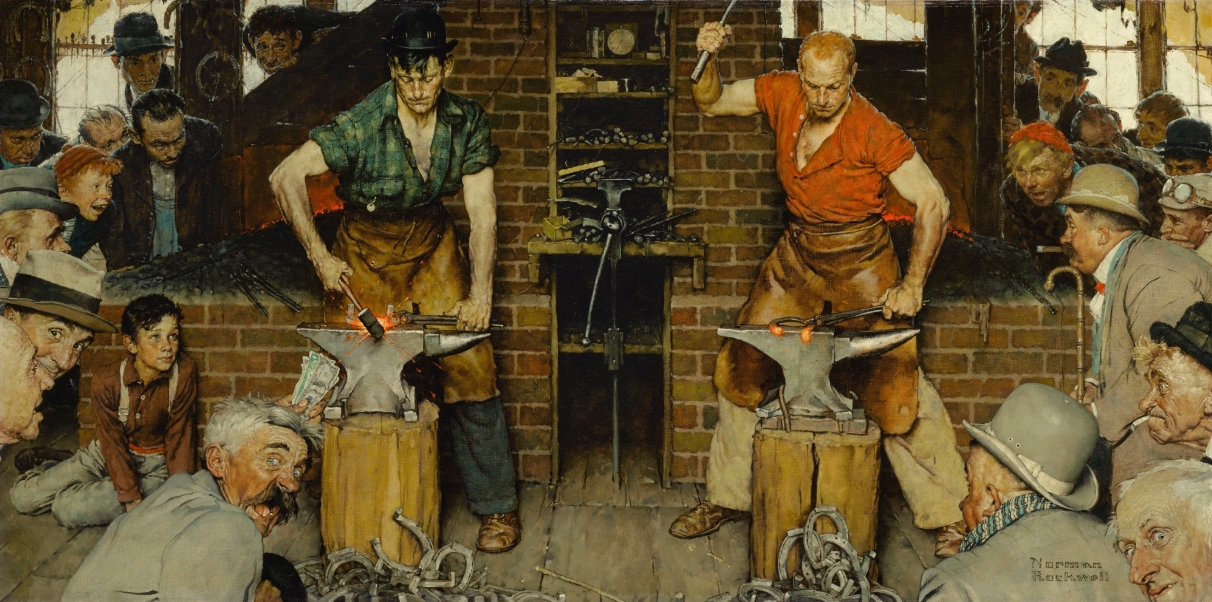
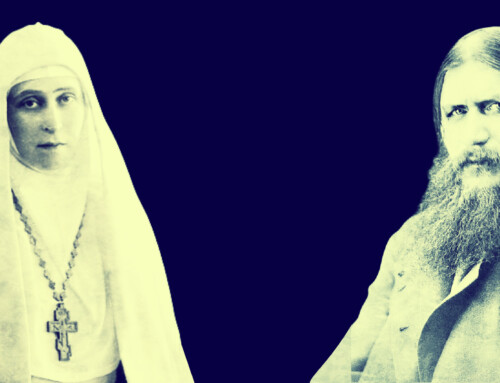
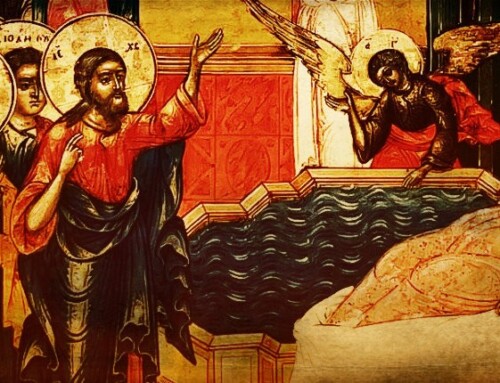
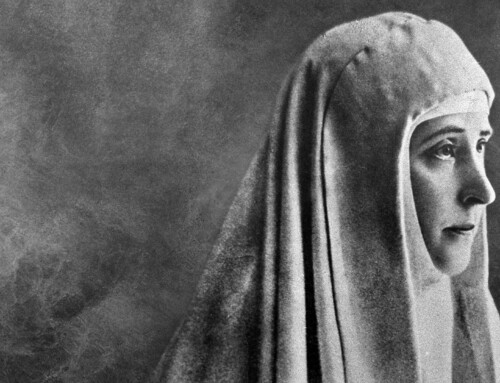
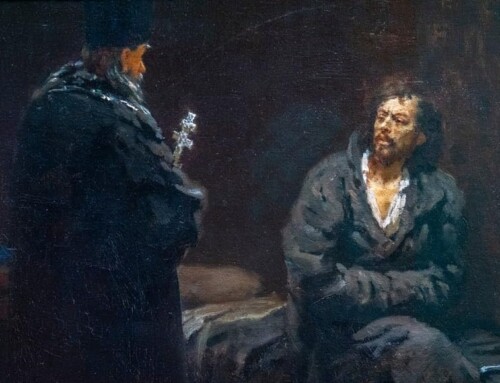
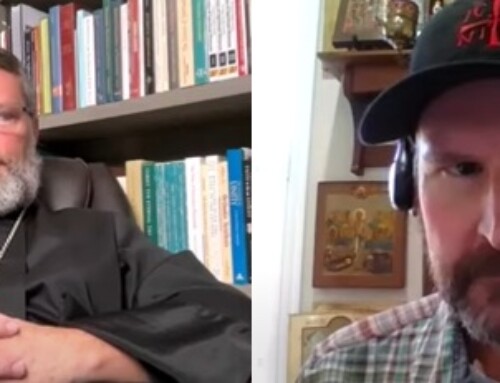
Joseph, this is a great article. I’ve invested some time reading books about masculine spirituality and you’ve really nailed some of the key issues. This is an exciting time for men to be living in. It will bring out the warrior in us!
Brilliant. Vivat Jesus.
Thank you.